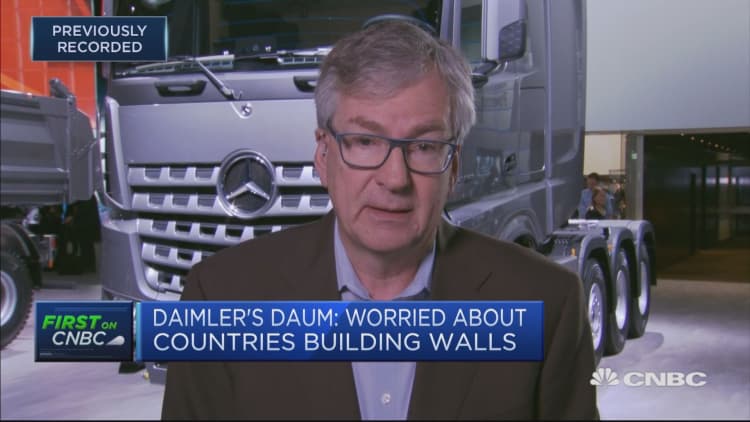
The escalating trade spat between the United States and China has impacted the autos sector with car-makers finding it increasingly tough to plan longer-term projects, a Daimler board member told CNBC on Wednesday.
"The steel and aluminium prices skyrocketed in the United States, making our tax more expensive there," Martin Daum said, adding that the big concern is planning future projects.
"These days, we talk about the products we are going to launch in 2022, 2023. We talk to our suppliers who have to invest heavily and they need stability to make those investment decisions."
Tensions escalated further after Beijing on Tuesday announced retaliatory duties on $60 billion worth of American goods following President Donald Trump's latest punitive action. On Monday night, the U.S. leader unveiled a 10 percent tariff on $200 billion worth of Chinese imports that will go into effect next week and eventually rise to 25 percent by year-end.
Last month, in a response to tariffs levied by the Trump administration, China announced 25 percent tariffs on $16 billion in U.S.-made goods. That included the roughly $10 billion in automobiles that Chinese motorists were expected to purchase this year.
"If everyone starts to build a wall and closes economies — we have seen examples of that all over the world — then, ultimately, the one who closes the border suffers," Daum told CNBC's "Squawk Box Europe."
Daum warned that it won't be the manufacturer that will get hurt, but consumers, who will feel the pressure of price increases.
"In the end, it is not the company that suffers, but the consumers that suffer because transportation might become more expensive and that ultimately impacts consumer prices in shelves and stores."
The European auto sector is a casualty of the trade war as manufacturing and the procurement of raw materials can involve cross-border movement. In addition, the tariffs on steel and aluminium and the uncertainty surrounding the future, and car-makers have found themselves struggling to meet targets.
In June, Trump threatened a 20 percent tariff on all car imports from the European Union. The president said on his Twitter feed that if the EU does not remove duties on U.S. cars, then the U.S. will have no choice but to act. The threat sent shares across the European auto sector into negative territory.
Currently, the U.S. imposes a 25 percent tariff on light trucks and pickups and 2.5 percent on smaller cars, while the EU imposes a 10 percent tariff on all passenger vehicles.
In August, EU Trade Commissioner Cecilia Malmstrom told the European Parliament's trade committee that the EU is "willing to bring down even our car tariffs to zero, all tariffs to zero, if the U.S. does the same." The offer was rejected by President Trump last month, in an interview with Bloomberg, for not being "good enough." Trump also said that the European Union is "almost as bad as China, just smaller."
Auto stocks dip
Stocks in the auto sector have been under immense pressure, facing headwinds from the ongoing trade war. The Euro Stoxx Autos index is down nearly 12 percent since the start of the year.
Charles Newsome, division director at Investec Wealth Management, said Wednesday that the sector is volatile.
"Auto makers should generally be avoided as they don't give sufficient security of long-term profitability," Newsome told CNBC's "Squawk Box Europe," adding that while at times they have been great investments, at other times they have been poor.
"I can see there were some very attractive valuations post the crisis and if people enjoy U.K. brands such as Ferrari, I can see some investment in that, but they are very cyclical businesses."


